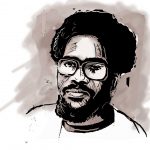The archipelago of Stuart Hall
The British-Jamaican sociologist Stuart Hall always keenly felt his dual identity. A new book, published posthumously, reveals his split sensibilities.
Author:
27 March 2019

When Stuart Hall, the widely admired social theorist, died in 2014 at the age of 82, he left behind an extensive legacy that reached across the Atlantic and former postcolonial worlds. Among many accomplishments, he served as the first editor in chief of the New Left Review.
He became a key figure in the establishment of cultural studies as an academic field through his involvement with and directorship of the Centre for Contemporary Cultural Studies at Birmingham University. And through his teaching he became an advisor and mentor to a number of students, perhaps most notably Paul Gilroy. These professional duties were accompanied by a number of influential essays that engaged such topics as popular media, policing, youth culture, Gramscian political thought, Thatcherism and, above all, race and racial identity in modern society.
Yet, despite his prodigious output over five decades, Hall never published a book that synthesised these engagements into an authoritative set of positions. To this very point, David Scott, a professor of anthropology at Columbia University and, like Hall, Jamaican, has written a book-length elegy, Stuart Hall’s Voice (2017), in which he remarks, “What there isn’t, though, in the extensive archive of your writings, is a Big Book in which you will be able to read, once and for all, ‘Stuart Hall’s Theory of Everything’. This book does not exist.”
Related article:
Scott’s deeply felt, posthumous correspondence with Hall in his book, which comprises six essay-letters, is simultaneously personal and cerebral, an acknowledgement of debt and an appeal for continued guidance. These reflective epistles not only mark an intellectual friendship, but they also suggest a new genre for tracing the routes of knowledge and its exchange – a practice extending well beyond the routines of academic citation to a more vulnerable and empathetic realm of confession and interpersonal tribute, enabling a momentary bridge of thought and feeling between the island of the living and the island of the dead.
“It is one of the stranger experiences of aftermaths, of awakening to irreversible finitude, that suddenly there is so much to say,” Scott writes toward the end of the book. “All the things that might have been talked about, but weren’t, when we enjoyed the illusion of an infinity of conjunctures-to-come, the illusion, you might have said, of a good night’s rest.”
Compendium of his works
The authoritative book of Hall’s that had never existed has since come into being through a series of books published by Duke University Press and edited by friends and his wife, the historian Catherine Hall. The books have collected Hall’s essays and lectures under such titles as Cultural Studies 1983 (based on a series of lectures he gave at the University of Illinois, Urbana-Champaign), Selected Political Writings (consisting of essays drawn from the New Left Review and elsewhere), and two volumes of Essential Essays, which address such topics as multiculturalism, race and ethnicity, and the effects of diasporic histories.
This posthumous series has also included a memoir of his childhood and early life entitled Familiar Stranger: A Life Between Two Islands (2018). As an autobiography by a well-known cultural critic, it shares a number of similarities with Edward Said’s Out of Place (1999) through themes of family memory, middle-class aspiration and existential displacement. The latter topic is more charged in Said’s memoir given the expulsion and exilic dislocation of many Palestinians – Said included – after the founding of Israel in 1948. But Hall’s memoir also possesses this sentiment of being out of place – if not by force, then by culture, class and race, in Jamaica and Britain alike.
As discussed in the preface by Bill Schwarz, the manuscript was unfinished at the time of Hall’s death, yet amounted to over 300 000 words. Originally conceived as a dialogue between Hall and Schwarz, it was decided to publish the book as it currently is, as a single narrative with Hall’s voice alone. The resulting book is consequently conventional in approach, starting with youth and concluding with his involvement in the founding of the New Left Review, a time which also coincided with his marriage to Catherine. These later years during the heady political days of the 1956 Suez Crisis, the Hungarian Revolution and the subsequent Soviet invasion during that same year, and the establishment of an anti-Stalinist socialist left in Britain during the 1950s more generally, will be familiar to most readers.
Twice at home
The sections that are more revealing are those dealing with the period before his academic and political career. Indeed, his depiction of the “two Jamaicas” and how his family was caught in between both illuminate the deep origins of his later politics, yet also how the political engagements of his adulthood were a choice – the conditions he was born into were ones of relative affluence that promised a secure middle-class existence in Kingston had he never left the island of his birth.
His father, Herman, was lower middle-class in background, but had worked his way up the ranks of the local branch of the United Fruit Company to become, in Hall’s words, the first “coloured man” to serve as its chief accountant. His mother, whom he sardonically introduces as “Miss Jessie”, is a more complex figure. Though of similar modest class origins to his father, she nonetheless aspired to a higher status. Hall relates how that side of the family had once included slave owners. “Plantation life constituted the aspirational model of her [his mother’s] hopes and fears,” Hall writes, “which she recast for her own family to adopt.”
This late colonial worldview that shaped the life of his family and childhood was countered by a second Jamaica that Hall witnessed in the same home – through their gardener, Cecil, and a number of domestic servants. “The backyard proper belonged to a different world,” Hall remarks. Yet it was this world that gradually captured his attention.
The labour strikes of 1938 in particular affected Hall’s thinking in ways that he could not fully grasp at the time. He was only six years old. Still, though the aforementioned events in Egypt and Eastern Europe marked his public political rise, it was this earlier unrest that unsettled the status quo embraced by his parents. It indicated not only a different part of Jamaican life, but one whose concerns underscored the beginning of the end of British control. Jamaica would become independent in 1962.
Related article:
Hall recalls these and other childhood moments with a sense of warmth and discomfort. He self-critically refers to himself at the start of the book as “the last colonial”. He was also not the only one affected. Hall mentions how his older sister, Patricia, once brought home a boyfriend who was darker in skin tone; his mother soon put an end to the relationship. Patricia suffered from a nervous breakdown shortly thereafter, from which she never fully recovered.
Hall describes his life as shaped by such contradictions, noting that his life was “formed as much by what my circumstances had made me as by the often unrecognised or unconscious struggle against my conditions of formation”. This conflict between accepting and rejecting one’s origins is a dialectic that went on to shape the rest of his life – not only informing his departure from Jamaica to Britain but also his restless thinking that ranged across topics, never quite settling. His leaving for study at Oxford in 1951 was a refusal of a locally bound future, only to be forced to confront his racial background once again in Britain, which he eventually made a career of in the decades ahead.
The title Familiar Stranger captures these ambiguities of self and the uncertain transitions between worlds – colonial and postcolonial, youth and adulthood, Jamaica and Britain. It suggests the uneasiness of revisiting a past that is at once recognisable and foreign, even to the person who lived it.
Hall’s memoir and the life it touches upon ultimately convey the archipelagos of experience and time that both fragment and give shape to individual lives. Inescapably posthumous in nature, Familiar Stranger presents a provisional response to David Scott’s elegiac missives to the dead.
Christopher J Lee is the author of Frantz Fanon: Toward a Revolutionary Humanism published by Jacana Media.


